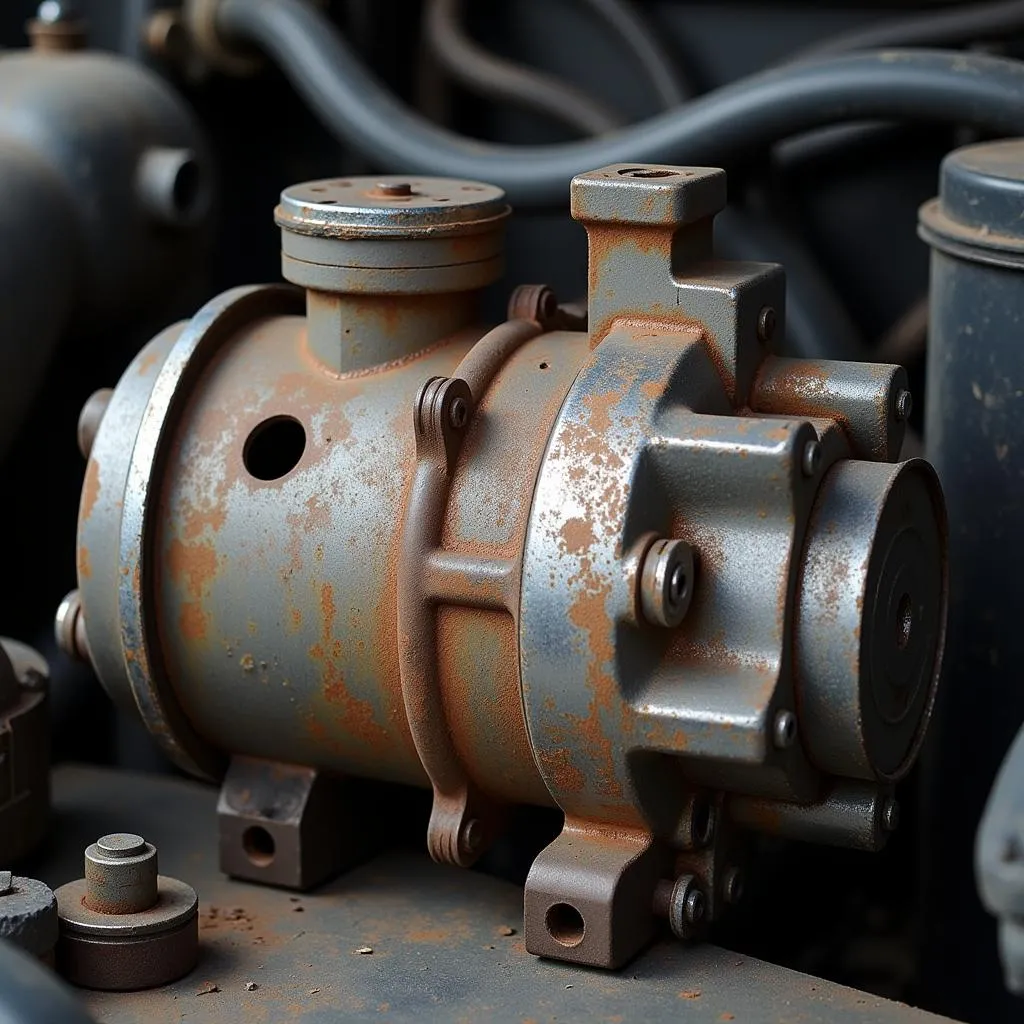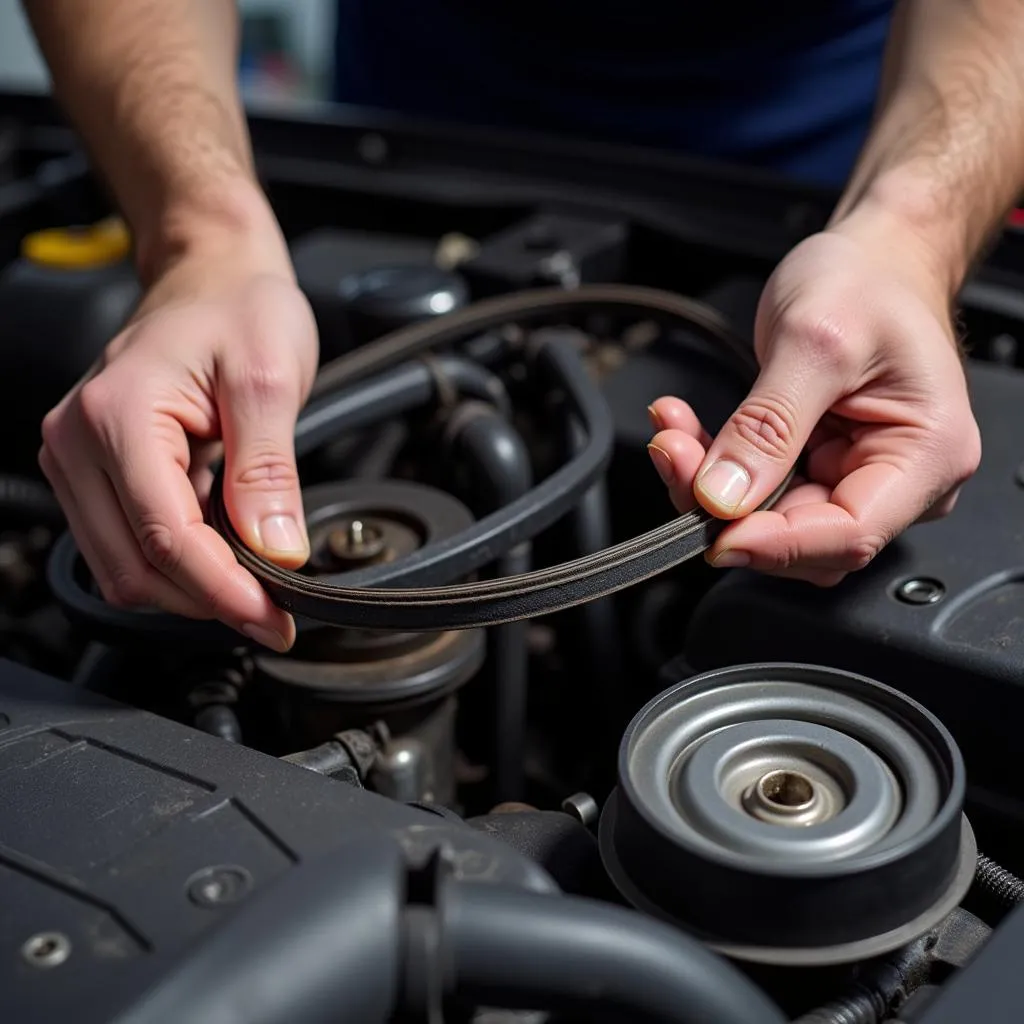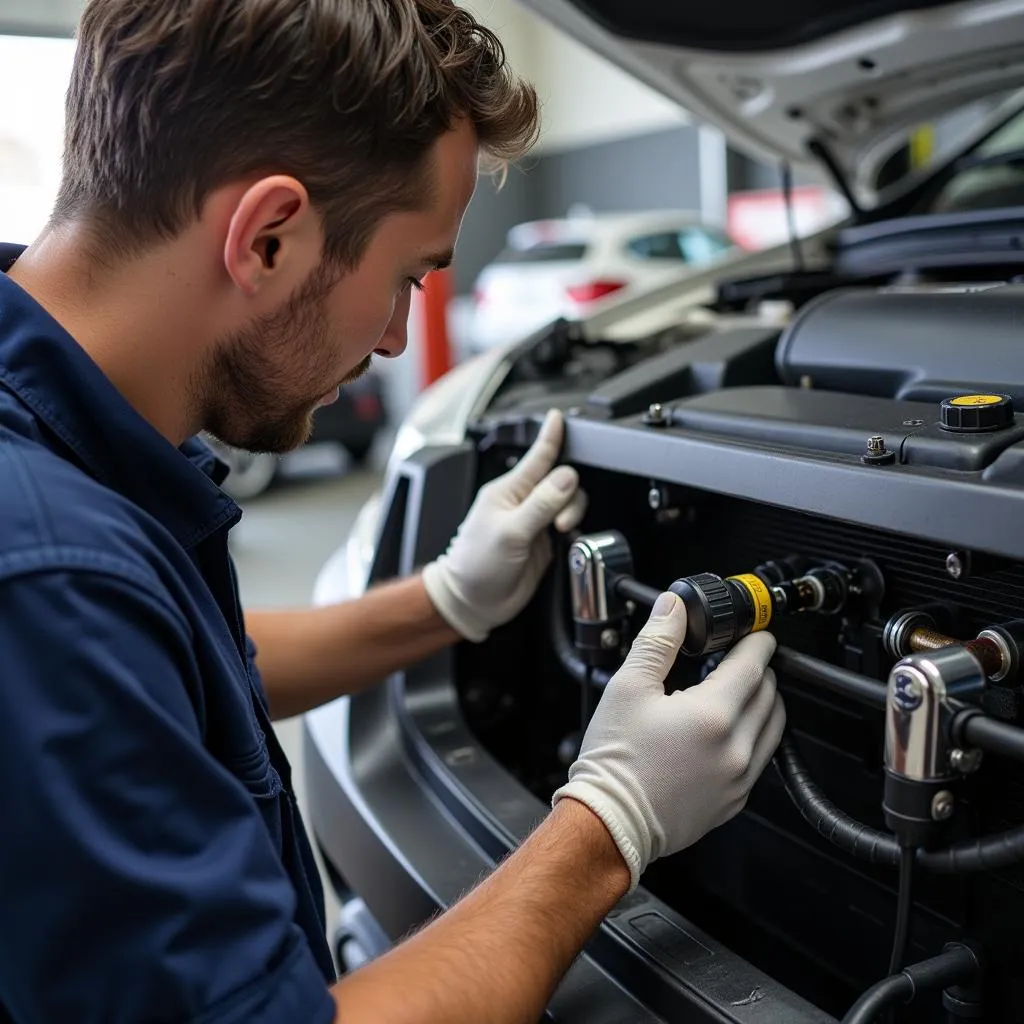A Noisy Car Ac can be more than just an annoyance; it can signal a serious issue with your vehicle’s cooling system. Whether it’s a rattling, squealing, clicking, or grinding sound, understanding the cause is key to finding the right solution. This article will explore the common culprits behind those disruptive AC noises and provide guidance on addressing them.
Common Causes of a Noisy Car AC
Several components within your car’s AC system can contribute to unwanted noise. Here are some of the most frequent offenders:
1. Low Refrigerant Levels
One of the most prevalent reasons for a noisy car AC is low refrigerant. Refrigerant is the lifeblood of your AC system, absorbing heat from the cabin and releasing it outside. If levels drop too low, it can cause the AC compressor to overwork and emit a high-pitched squealing or whining noise.
2. Worn-Out AC Compressor
The AC compressor is the heart of your cooling system, responsible for compressing and circulating refrigerant. Over time, the compressor’s internal components, such as bearings and clutches, can wear down. This wear and tear can manifest as a grinding or rattling noise, especially when the AC is engaged.
 Worn-out AC compressor with visible wear and tear
Worn-out AC compressor with visible wear and tear
3. Failing AC Condenser Fan
Located in front of the radiator, the AC condenser fan plays a crucial role in cooling the refrigerant. If the fan motor fails or the fan blades become damaged, it can lead to reduced cooling efficiency and potentially a loud humming or roaring noise emanating from the front of your vehicle.
4. Malfunctioning AC Blower Motor
The blower motor is responsible for pushing cool air into your car’s cabin. When the motor bearings wear out or debris obstructs the fan blades, it can cause a range of noises, from a light tapping or clicking to a loud whirring sound, especially at higher fan speeds.
5. Loose or Damaged Belts
Your car AC system relies on belts to drive the compressor and other components. A loose, worn, or cracked belt can produce a high-pitched squealing or chirping noise, particularly when you first start your car or accelerate.
Troubleshooting and Solutions
Addressing a noisy car AC often requires professional diagnosis and repair. However, here are some general troubleshooting steps you can take:
- Check the AC Belt: Visually inspect the AC belt for any signs of cracks, fraying, or looseness. If you notice any issues, it’s best to have the belt replaced by a qualified mechanic.
- Inspect the AC Condenser: Examine the AC condenser, located at the front of your vehicle, for any debris, such as leaves or dirt, that might be blocking airflow. Carefully remove any obstructions.
- Listen for Noise Variations: Pay attention to when the noise occurs and how it changes. Does it happen only when you turn the AC on? Does it worsen as you increase the fan speed? Noting these details can help a mechanic pinpoint the source of the problem.
 Mechanic inspecting a car AC belt for damage
Mechanic inspecting a car AC belt for damage
When to Seek Professional Help
If the noise persists despite basic troubleshooting, it’s crucial to consult a qualified mechanic specializing in car AC repair. They have the expertise and specialized tools to diagnose and fix more complex issues, such as:
- Refrigerant Leak Detection and Repair: Mechanics have specialized equipment to detect and repair refrigerant leaks, ensuring your AC system is properly charged.
- AC Compressor Replacement: If the compressor is failing, it’s a complex repair best left to professionals. They can safely remove the old compressor, install a new one, and ensure the system is properly evacuated and recharged.
- AC System Flushing: In cases of severe contamination or component failure, a mechanic may recommend flushing the entire AC system to remove debris and contaminants before installing new parts.
Preventing Noisy Car AC Issues
Regular maintenance is key to preventing future issues with your car’s AC system:
- Schedule Annual AC Inspections: Have your car’s AC system inspected annually by a qualified mechanic, especially before the start of the warmer months. They can check for potential problems, such as refrigerant leaks or worn components, before they escalate into major issues.
- Replace Cabin Air Filter Regularly: The cabin air filter prevents dust, pollen, and other debris from entering your car’s HVAC system. A clogged filter can restrict airflow and put extra strain on the blower motor, potentially leading to noise and reduced cooling efficiency. Consult your owner’s manual for the recommended replacement interval for your vehicle’s cabin air filter.
- Run Your AC Briefly During Cooler Months: Even during the cooler months, running your car’s AC system for a few minutes each month helps circulate the refrigerant and lubricate the system’s components, preventing seals from drying out and potentially leading to leaks.
 Mechanic checking refrigerant levels during a car AC inspection
Mechanic checking refrigerant levels during a car AC inspection
Conclusion
A noisy car AC shouldn’t be ignored. By understanding the common causes and taking proactive steps to address them, you can keep your car’s cooling system running smoothly and avoid costly repairs down the road. Remember, if you encounter persistent AC noise or suspect a more serious issue, seeking professional help is always the safest and most effective course of action.
FAQ
What does it mean when my car AC makes a clicking noise?
A clicking noise could indicate a problem with the AC compressor clutch, a relay, or even debris in the blower motor.
Why is my car AC making a hissing noise?
A hissing noise could be a sign of a refrigerant leak, which should be addressed by a qualified mechanic immediately.
How often should I recharge my car’s AC?
If your car’s AC is working correctly and there are no leaks, you shouldn’t need to recharge it frequently. However, it’s a good idea to have the refrigerant levels checked during your annual AC inspection.
Can I use my car AC if it’s making a noise?
While you can technically still use your car AC if it’s making a noise, it’s not recommended. Continuing to operate a malfunctioning AC system can lead to further damage and more expensive repairs.
Related Resources
For more information on car maintenance and troubleshooting, check out these helpful resources:
Need Help?
Having trouble with your car’s AC or other automotive issues? Our team of expert mechanics is here to help. Contact us via WhatsApp: +1(641)206-8880, Email: [email protected], or visit us at 276 Reock St, City of Orange, NJ 07050, United States. We’re available 24/7 to assist with all your automotive needs!
